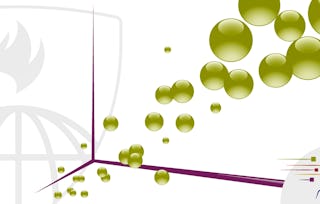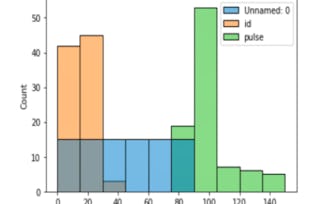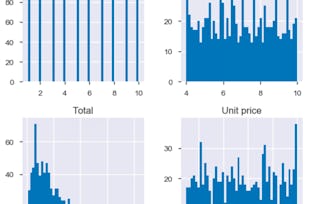Die statistische Analyse ist ein unverzichtbarer Aspekt der Datenanalyse, denn sie ermöglicht es uns, Daten zu sammeln, zu überprüfen und zu analysieren, um wertvolle Schlussfolgerungen in verschiedenen Branchen zu ziehen. Aus diesem Grund wird der Markt für Statistiker in Zukunft voraussichtlich wachsen. Wenn Sie Ihr Fachwissen in den Bereichen Statistik und Wahrscheinlichkeitsrechnung ausbauen und etwas über Datenvisualisierung lernen möchten, ist dieser Kurzkurs eine hervorragende Einführung in die Statistik als die Kunst, aus Daten zu lernen.

Explorative Datenanalyse

Empfohlene Erfahrung
Was Sie lernen werden
Erläuterung der verschiedenen Datentypen und Anwendung von Datenvorbereitungsmethoden zur Bereinigung von Daten.
Erkundung von Möglichkeiten zur Visualisierung von Daten mit Hilfe der Software R.
Verstehen, wie die Visualisierung von Daten zur Auswahl statistischer Modelle beitragen kann.
Kompetenzen, die Sie erwerben
- Kategorie: Wahrscheinlichkeitsverteilung
- Kategorie: R (Software)
- Kategorie: Deskriptive Statistik
- Kategorie: Datenanalyse
- Kategorie: Explorative Datenanalyse
- Kategorie: Wahrscheinlichkeit
- Kategorie: Histogramm
- Kategorie: Statistische Methoden
- Kategorie: Statistische Modellierung
- Kategorie: Datenvisualisierung
- Kategorie: Datenvisualisierungssoftware
- Kategorie: Vorverarbeitung der Daten
- Kategorie: Box Plots
- Kategorie: Statistik
- Kategorie: Daten bereinigen
Wichtige Details

Zu Ihrem LinkedIn-Profil hinzufügen
Erfahren Sie, wie Mitarbeiter führender Unternehmen gefragte Kompetenzen erwerben.

In diesem Kurs gibt es 3 Module
In dieser ersten Woche werden Sie mit Datentypen (kategorisch, diskret und kontinuierlich) und der Darstellung von Daten durch grafische Zusammenfassungen (oder Datenvisualisierung) vertraut gemacht. Sie gehen die Schritte durch, die Sie unternehmen müssen, um Daten für die Analyse und Datenbereinigung vorzubereiten, indem Sie fehlende Daten und Ausreißer identifizieren. Sie lernen und üben gängige grafische Zusammenfassungen wie Box-Plots, Histogramme und die Kernel-Dichte-Schätzung (KDE).
Das ist alles enthalten
5 Videos7 Lektüren1 Quiz1 Aufgabe1 Unbewertetes Labor
In dieser zweiten Woche haben Sie die Möglichkeit, Ihr Wissen über grafische Zusammenfassungen aus Woche 1 vertieft anzuwenden, indem Sie Aufgaben in RStudio erledigen, wie z. B. die Vorbereitung von Daten für die Analyse und die Datenbereinigung, indem Sie fehlende Daten und Ausreißer identifizieren.
Das ist alles enthalten
2 Lektüren1 Quiz1 Diskussionsthema1 Unbewertetes Labor
In dieser letzten Woche haben Sie die Möglichkeit, auf Ihren Erfahrungen mit RStudio und der Datenanalyse mit grafischen Zusammenfassungen in Woche 2 aufzubauen. In Woche 3 bearbeiten Sie eine inhaltliche Aufgabe in RStudio und führen eine benotete Peer-Review durch, bei der Sie Ihre Ergebnisse aus dem RStudio-Labor mit einem Kommilitonen teilen.
Das ist alles enthalten
2 Lektüren1 peer review1 Unbewertetes Labor
Bereiten Sie sich auf einen Abschluss vor.
Wenn Sie Kurs von University of Leeds absolvieren, erhalten Sie möglicherweise eine Vorschau der Themen, Materialien und Lehrkräfte für einen verwandten Studiengang. So können Sie besser einschätzen, ob das Thema oder die Universität die richtige Wahl für Sie wäre.
Dozent

Mehr von Datenanalyse entdecken
 Status: Kostenloser Testzeitraum
Status: Kostenloser TestzeitraumJohns Hopkins University
 Status: Vorschau
Status: VorschauUniversity of Leeds
Warum entscheiden sich Menschen für Coursera für ihre Karriere?

Felipe M.

Jennifer J.

Larry W.

Chaitanya A.

Neue Karrieremöglichkeiten mit Coursera Plus
Unbegrenzter Zugang zu 10,000+ Weltklasse-Kursen, praktischen Projekten und berufsqualifizierenden Zertifikatsprogrammen - alles in Ihrem Abonnement enthalten
Bringen Sie Ihre Karriere mit einem Online-Abschluss voran.
Erwerben Sie einen Abschluss von erstklassigen Universitäten – 100 % online
Schließen Sie sich mehr als 3.400 Unternehmen in aller Welt an, die sich für Coursera for Business entschieden haben.
Schulen Sie Ihre Mitarbeiter*innen, um sich in der digitalen Wirtschaft zu behaupten.
Häufig gestellte Fragen
Dieser Kurs ist ein Schnupperkurs zum MSc Datenwissenschaft (Statik) auf Coursera. Der Abschluss des Kurses führt nicht zu einer Anrechnung auf dieses Programm. Der Kurs kann von allen Lernenden, die an explorativer Datenanalyse und Visualisierung interessiert sind, unabhängig absolviert werden.
Um Zugang zu den Kursmaterialien und Aufgaben zu erhalten und um ein Zertifikat zu erwerben, müssen Sie die Zertifikatserfahrung erwerben, wenn Sie sich für einen Kurs anmelden. Sie können stattdessen eine kostenlose Testversion ausprobieren oder finanzielle Unterstützung beantragen. Der Kurs kann stattdessen die Option "Vollständiger Kurs, kein Zertifikat" anbieten. Mit dieser Option können Sie alle Kursmaterialien einsehen, die erforderlichen Bewertungen abgeben und eine Abschlussnote erhalten. Dies bedeutet auch, dass Sie kein Zertifikat erwerben können.
Wenn Sie ein Zertifikat erwerben, erhalten Sie Zugang zu allen Kursmaterialien, einschließlich der benoteten Aufgaben. Nach Abschluss des Kurses wird Ihr elektronisches Zertifikat zu Ihrer Erfolgsseite hinzugefügt - von dort aus können Sie Ihr Zertifikat ausdrucken oder zu Ihrem LinkedIn-Profil hinzufügen.
Weitere Fragen
Finanzielle Unterstützung verfügbar,
¹ Einige Aufgaben in diesem Kurs werden mit AI bewertet. Für diese Aufgaben werden Ihre Daten in Übereinstimmung mit Datenschutzhinweis von Courseraverwendet.



